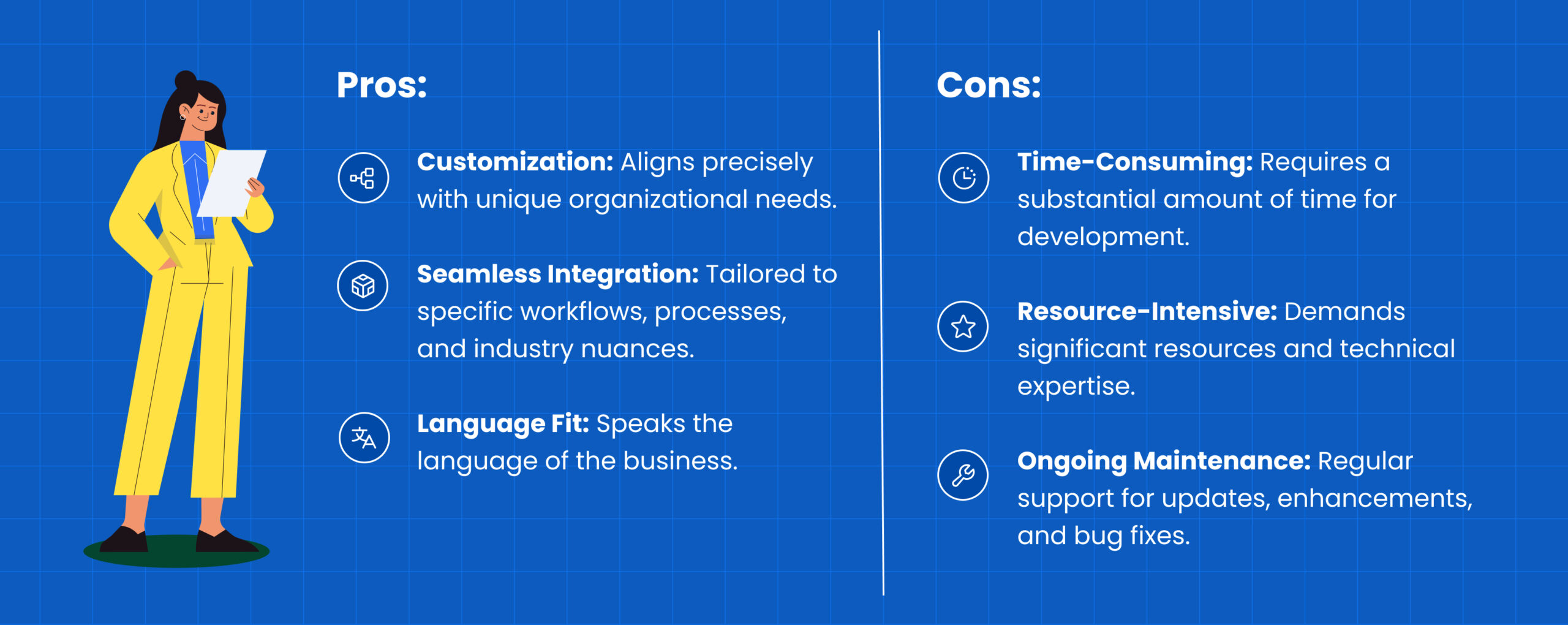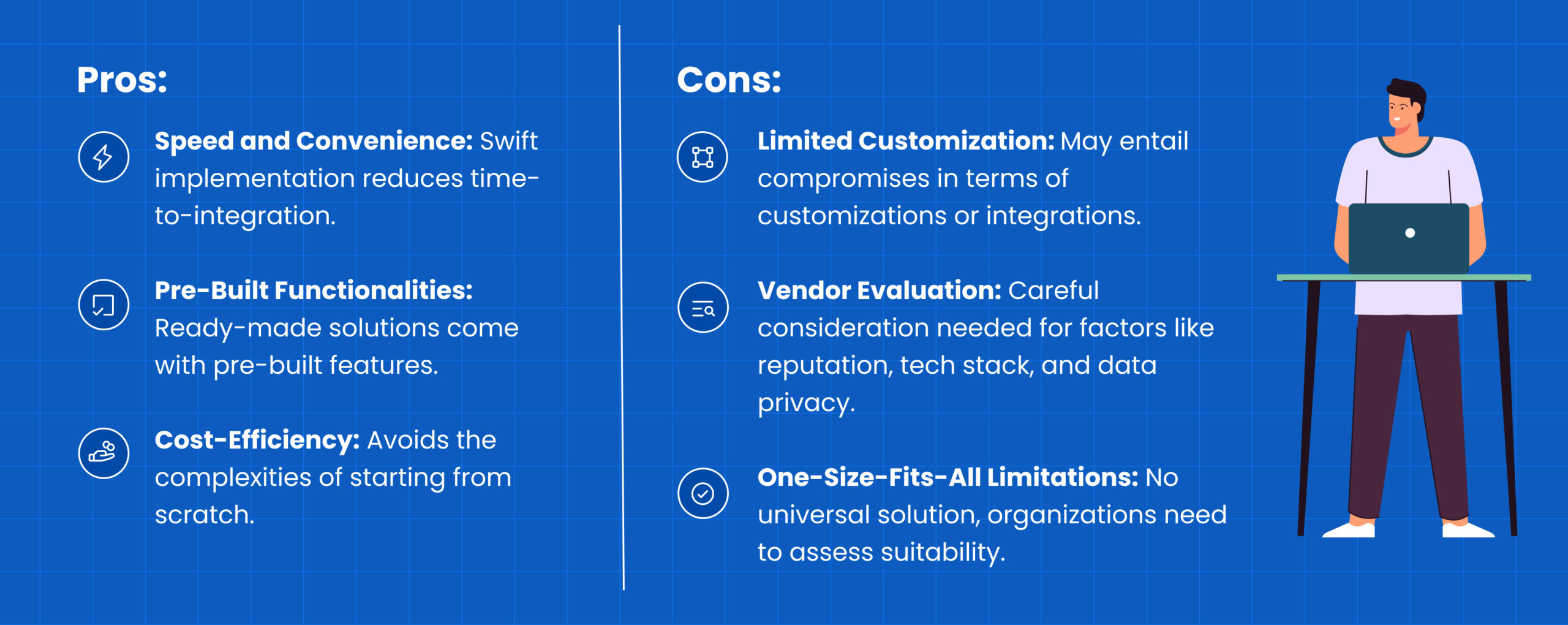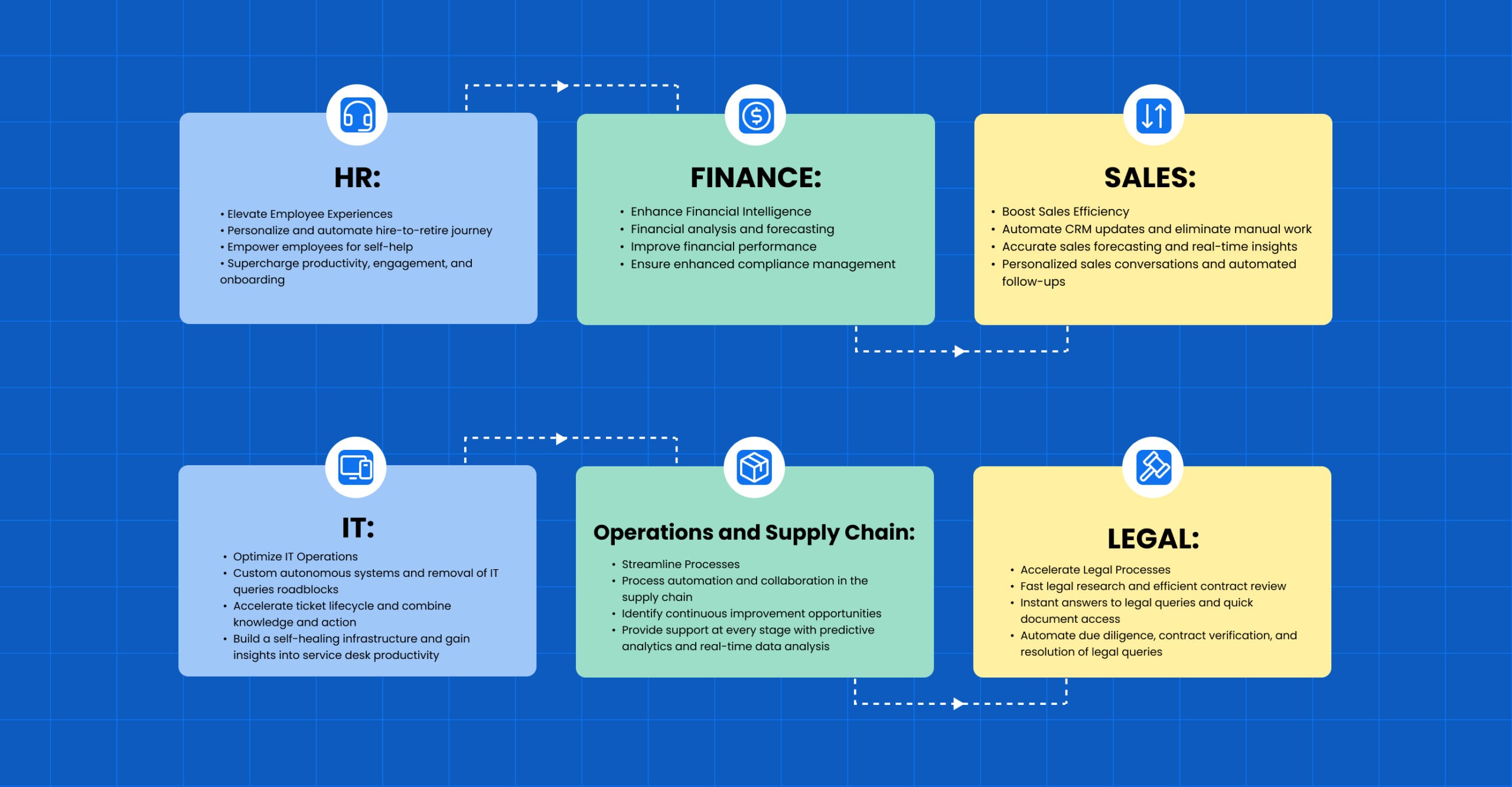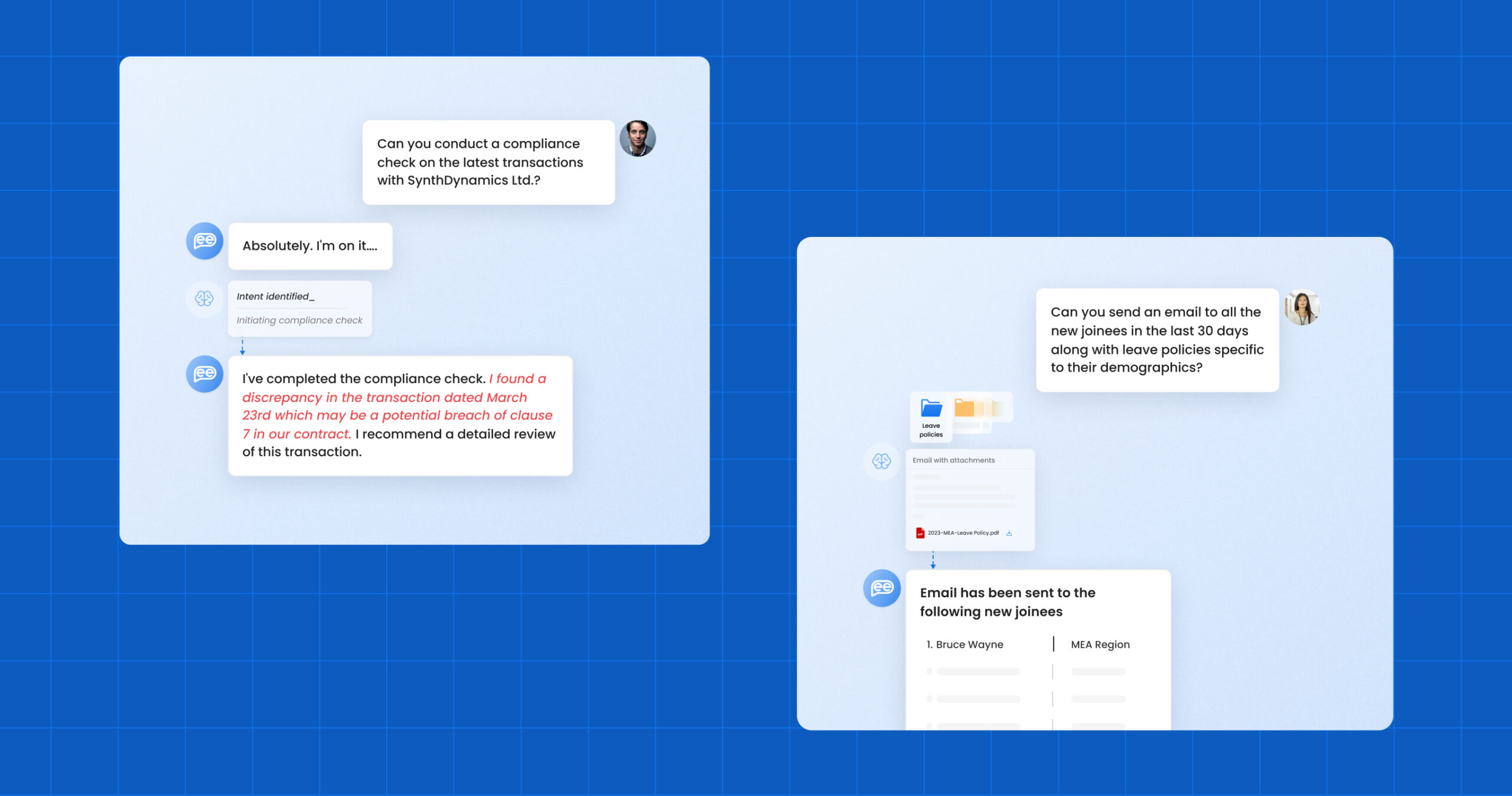For a business to survive and thrive in today’s ever-changing landscape, staying ahead demands more than just innovation—it requires strategic efficiency. Efficiency at every step, in every department, and in every facet. The enterprise virtual assistant is designed to achieve just that. A virtual assistant for enterprises redefines the operational terrain of organizations and significantly impacts customer and employee experiences.
What is an enterprise virtual assistant?
Enterprise virtual assistants use artificial intelligence and natural language understanding to understand user commands, undertake certain tasks on their behalf, and answer any questions they may have. AI-powered virtual assistants for enterprises are a step ahead of the conventional bots; they go beyond just automation, demonstrating an advanced ability to comprehend natural language, learn from interactions, and adapt to the ever-evolving needs of an organization.
An AI virtual assistant for enterprise harnesses the power of deep integrations and seamlessly connects with all your frequently used platforms, HRIS, ITSM, ERPs, CRMs, communication channels, etc., to create a fully supported and functional environment. Acting as a virtual personal assistant for enterprise employees, they automate routine tasks, empower better decision-making, make enterprise knowledge accessible, and create self-service capabilities for a personalized experience for employees.
Why do you need an enterprise virtual assistant?
Your organization needs an enterprise virtual assistant, simply put, for operational excellence. Every employee has a myriad of roles and responsibilities, add to that the operational tasks of applying for leaves, blocking calendars, accessing information related to benefits, raising tickets, etc. This virtual personal assistant for enterprise employees is needed so that they don’t get stuck in the rut of handling routine tasks, and can focus on high-impact strategic initiatives that contribute to business growth.
The need for a virtual assistant for enterprise is rooted in the growing complexity of organizational tasks. As businesses evolve, the need for streamlined processes becomes indispensable. An AI-powered virtual assistant for enterprise enhances overall agility, efficiency, and productivity.
AI virtual assistant for enterprise: To build or buy?
The decision to build or buy an AI-powered enterprise virtual assistant comes with its own set of advantages, considerations, and challenges, impacting the overall effectiveness of the virtual assistant within the organizational framework. The choice ultimately depends on the organization’s priorities, resources, and strategic objectives.

The pros of building an enterprise virtual assistant software
Building an enterprise virtual assistant software provides a level of customization that aligns precisely with the unique needs of your organization. Tailoring the enterprise virtual assistant to specific workflows, processes, and industry nuances can result in a seamlessly integrated solution that truly speaks the language of the business.
The cons of building an enterprise virtual assistant software
Building a virtual assistant software from scratch comes with a plethora of challenges. It requires a substantial amount of time, resources, and technical expertise. The development process is a complex endeavor and takes away from the bandwidth of many resources to ensure it aligns with your business strategy, communication strategy, engagement strategy, etc. Additionally, it will also require a regular and robust support system for updates, enhancements, bug fixes, etc. It’s not a one-time initiative but evolves with your business.

The pros of buying an enterprise virtual assistant software
Opting to buy an existing enterprise virtual assistant software offers speed and convenience. Ready-made AI virtual assistants for enterprise often come with pre-built functionalities, reducing the time-to-implementation significantly. Buying an enterprise virtual assistant software is especially beneficial for businesses seeking a swift integration without the complexities of starting from ground zero.
The cons of buying an enterprise virtual assistant software
Buying definitely provides expediency, but it can sometimes entail compromises in terms of customizations or integrations. While there is no one-size-fits-all virtual assistant for enterprise, organizations need to carefully evaluate vendors on key factors such as past reputation and experience, tech stack, integrations, AI model training and data source, user interface, data privacy and security, future roadmap, task automation, context awareness, personalization, real-time insights, etc.
Generative AI-powered virtual assistants for enterprise are swiftly solving these problems and providing holistic integration and customization capabilities tailored for your organizational use cases.
Benefits of virtual assistant for enterprise employees
Embracing the power of an AI-powered virtual assistant for enterprise not only enhances productivity but also brings a strategic advantage to your organization. Here are some beenfits of using a virtual personal assistant for enterprise employees:
Enhanced productivity
The hallmark of an enterprise virtual assistant lies in its ability to automate repetitive tasks, liberating human resources from the shackles of monotony. This, in turn, accelerates workflows, significantly reducing manual effort and fostering an environment where productivity thrives. The result is a workforce engaged in tasks that truly leverage their skills and contribute to the organization’s growth.
Improved decision-making
In the age of data, the ability to make informed decisions is a competitive advantage. The AI virtual assistant for enterprises functions as a gateway to real-time data and actionable insights, empowering decision-makers at every level of the organization.
Cost-efficiency
The financial implications of deploying an enterprise virtual assistant extend beyond initial investments. Consider the long-term savings derived from reduced labor costs, improved accuracy, and minimized operational inefficiencies.
Scalability and Flexibility
The dynamic nature of business demands solutions that can scale alongside growth. An enterprise virtual assistant, when properly designed, offers scalability without compromising efficiency.
Use cases of AI-powered virtual assistant for enterprise

AI virtual assistants for enterprise revolutionize operations across diverse departments, providing more than just automation. Explore how they drive efficiency and elevate employee experiences in key organizational functions:
HR
Streamlining the onboarding process is a common challenge for HR departments. An enterprise virtual assistant can automate documentation processes, guide new hires through essential information, and even provide personalized support.
Imagine a new employee receiving a personalized welcome message, along with an interactive guide that assists them in completing necessary paperwork. The virtual assistant is on standby to answer queries, creating a positive onboarding experience.
Beyond onboarding, the virtual assistant continues to support HR functions by handling routine inquiries, updating employee records, and facilitating communication within the organization.
IT
IT departments often grapple with a barrage of technical support requests. An enterprise virtual assistant can act as a first responder, providing instant support for common technical issues.
Consider an employee encountering a software glitch. Instead of submitting a ticket and waiting for resolution, the virtual assistant troubleshoots the problem in real-time, guiding the employee through a series of self-help solutions.
This not only reduces downtime but also empowers employees to resolve technical issues independently, fostering a culture of tech-savvy autonomy within the organization.
Finance
Expense reporting is a critical yet time-consuming task for finance departments. An enterprise virtual assistant can simplify this process by automating data entry, enforcing expense policies, and expediting approval workflows.
Envision a scenario where employees submit expense reports through a conversational interface. The virtual assistant validates receipts, ensures compliance with company policies, and seamlessly integrates approved expenses into financial systems.
The result is a streamlined and error-free expense reporting process, allowing finance teams to focus on strategic financial planning rather than administrative minutiae.
Procurement
Supply chain and procurement processes are intricate and susceptible to inefficiencies. An enterprise virtual assistant can optimize these processes by providing real-time updates on inventory levels, tracking orders, and facilitating procurement workflows.
Picture a procurement manager seeking information on current inventory levels. The virtual assistant not only delivers accurate data but also suggests optimal ordering quantities based on historical trends and current demand forecasts.
This level of precision ensures that the procurement process aligns with organizational needs, minimizing the risk of stockouts or overstock situations.
Legal
Legal departments often grapple with voluminous documentation and complex contract review processes. An enterprise virtual assistant can expedite these tasks by analyzing documents, automating redlining, and managing legal workflows.
Imagine a legal team tasked with reviewing contracts. The virtual assistant, equipped with natural language processing capabilities, swiftly analyzes contract clauses, highlights potential risks, and even suggests revisions.
This not only accelerates the contract review process but also enhances the overall efficiency of legal operations.
Sales
Sales teams rely on efficient lead management to drive revenue. An enterprise virtual assistant can accelerate this process by automating data entry, providing real-time information on leads, and offering proactive follow-up reminders.
Consider a scenario where a sales representative receives a new lead. The virtual assistant not only enters relevant data into the CRM system but also triggers automated follow-up emails, ensuring timely engagement with potential clients.
This level of automation ensures that sales teams can focus on building relationships and closing deals rather than getting bogged down by administrative tasks.
The versatility of an enterprise virtual assistant shines through in its ability to enhance operations across various departments. From HR and IT to Finance, Procurement, Legal, and Sales, the virtual assistant proves to be a valuable asset, optimizing processes and fostering efficiency at every turn.
What does a business virtual assistant do?
A business virtual assistant is not merely a tool; it’s a multifaceted solution that aligns with the diverse needs of a business environment. Its functionalities span a wide spectrum, making it a dynamic and indispensable component of modern organizational operations.

Task Automation
At its core, the virtual assistant excels in task automation. Routine and time-consuming processes that once demanded human intervention are now seamlessly executed by the virtual assistant. This includes data entry, report generation, and other repetitive tasks.
Picture a scenario where a business executive needs to compile a comprehensive report. The virtual assistant not only collates the required data from various sources but also formats and presents it in a ready-to-use document.
This automation not only saves time but also reduces the risk of human errors associated with manual data handling.
Natural Language Processing (NLP)
The ability to comprehend and respond to natural language is a defining feature of the virtual assistant. This makes interactions with the system intuitive and user-friendly, enhancing its accessibility across different levels of an organization.
Consider an employee seeking information on company policies. Instead of navigating through complex documentation, the employee can simply ask the virtual assistant, receiving a prompt and contextually relevant response.
This level of natural language understanding fosters a conversational and user-centric experience.
Decision Support
The virtual assistant acts as a reliable ally in decision-making processes. By analyzing data, providing insights, and even offering recommendations, it becomes an invaluable resource for executives seeking to make informed choices.
Imagine a business leader contemplating a strategic decision. The virtual assistant not only presents relevant data but also offers predictive analytics, helping the leader anticipate potential outcomes.
This decision support capability positions the virtual assistant as a strategic partner in organizational planning and execution.
Continuous Learning
Adaptability is a key strength of the virtual assistant. Through continuous learning mechanisms, it evolves alongside the organization, staying attuned to shifting priorities, industry trends, and emerging technologies.
Suppose a business undergoes a significant process change. The virtual assistant not only adapts to the new workflow but also proactively suggests optimizations based on its learning from similar transitions.
This adaptability ensures that the virtual assistant remains a cutting-edge solution, always aligned with the organization’s goals.
Conclusion
The impact of enterprise virtual assistants goes far beyond mere automation. They represent a strategic shift in the way organizations operate, fostering efficiency, enhancing employee experiences, and positioning businesses for sustained success.
Whether deciding to build or buy, the key lies in aligning the virtual assistant with the unique needs and goals of the organization. The benefits, spanning enhanced productivity, improved decision-making, cost-efficiency, and scalability, underscore its significance in the modern business landscape.
Across various departments, from HR and IT to Finance, Procurement, Legal, and Sales, the virtual assistant proves its versatility, optimizing processes and driving efficiency. It’s not just a tool; it’s a strategic ally that adapts, learns, and evolves alongside the organization.
As the digital era unfolds, organizations must embrace the transformative power of Enterprise Virtual Assistants to stay agile, competitive, and resilient. The journey to operational excellence begins with understanding the potential within reach—a potential that lies within the capabilities of a well-implemented and strategically aligned virtual assistant.






